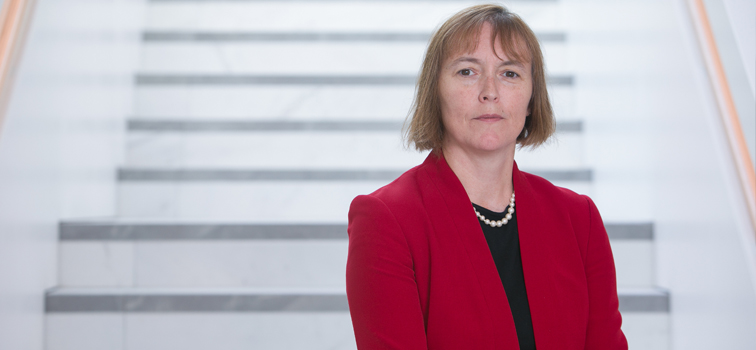Building resilience to economic risks both inside and out – Deputy Governor Sharon Donnery
08 March 2019
Press Release

- As a small, open economy, Ireland is vulnerable to both cyclical and structural risks
- Brexit is not the only risk – heightened international uncertainty and risk of domestic overheating cannot be ignored
- Response must be a proactive building of buffers and the use of macro-prudential tools, which are essential to build resilience
Deputy Governor Sharon Donnery today addressed the Institute of International and European Affairs (IIEA) in Dublin with a speech titled “Risks and Resilience in Uncertain Times.” In her address, she highlighted the need to build up resilience in the economy and financial system in the face of a two-pronged threat: the external environment, including a disorderly exit of the UK from the European Union, and the risk of overheating of the domestic economy.
She explained that as a small, highly globalised economy, Ireland is particularly vulnerable not only to shocks to the global economic cycle – known as cyclical risks – but also by a range of structural shocks coming from abroad. These can include changes to global trade patterns or international taxation regimes.
The UK’s departure from the EU is currently one of the most immediate structural risks facing the economy. Speaking earlier this week at an internal staff address, Deputy Governor Donnery explained the unique challenges facing Ireland and outlined the contingency planning in the Irish financial system.
Speaking at the IIEA, the Deputy Governor said: “Risks are prevalent from both inside and out. However, it is important that we are not complacent in thinking that the UK’s departure from the EU is the only risk to the Irish economic outlook. The international outlook is uncertain. And should we avoid a disorderly UK exit, and the dent to Irish economic growth that comes with it, a continued fast-growing economy is only desirable as long as growth is sustainable.”
She went on to explain that economies can grow too fast and overheat, especially where they reach the limits of their capacity. Households and firms can become over-optimistic about their future income prospects, taking on too much debt. If this future income fails to materialise, readjusting to a sustainable growth path can be painful. With Ireland approaching full employment, leaving little spare capacity for further growth, there is a need to guard against the risk that economic conditions give rise to overheating dynamics.
The Deputy Governor continued: “We find ourselves in the interesting position of assessing a potential slowdown in the external international environment, the UK departing the EU, while also worrying about potential overheating from a domestic perspective. Plotting a course through such an environment, with the potential for a wide range of future outcomes, is indeed challenging.”
She concluded by speaking of the need to build resilience to such risks, explaining that if buffers are built up during good times, policy can react during a downturn. Reducing Ireland’s high debt to safer levels should remain a priority. Saving rather than spending the windfalls gains from unexpected corporation taxes or interest savings would also help mitigate risks. In addition to fiscal buffers, a range of macro-prudential tools, such as the Central Bank mortgage measures and countercyclical capital buffer, can help the financial system absorb shocks and ensure it does not react in a way that further deepens the economic stress faced by households and firms in a downturn.
The Deputy Governor concluded: “It is vital that a small and highly globalised economy like Ireland is proactive in using macro-prudential policy to mitigate systemic risk and build resilience.”